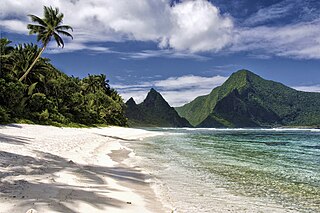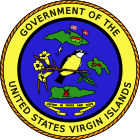
The British Virgin Islands (BVI), officially the Virgin Islands, are a British Overseas Territory in the Caribbean, to the east of Puerto Rico and the US Virgin Islands and north-west of Anguilla. The islands are geographically part of the Virgin Islands archipelago and are located in the Leeward Islands of the Lesser Antilles and part of the West Indies.

The Eleventh Amendment is an amendment to the United States Constitution which was passed by Congress on March 4, 1794, and ratified by the states on February 7, 1795. The Eleventh Amendment restricts the ability of individuals to bring suit against states of which they are not citizens in federal court.

The United States Virgin Islands, officially the Virgin Islands of the United States, are a group of Caribbean islands and a territory of the United States. The islands are geographically part of the Virgin Islands archipelago and are located in the Leeward Islands of the Lesser Antilles. The islands have a tropical climate.

Politics of the United States Virgin Islands takes place in a framework of a presidential representative democratic dependency, whereby the governor is the head of the territory's government, and of a multi-party system. United States Virgin Islands are an unincorporated and organized territory of the United States, administered by the Office of Insular Affairs of the United States Department of the Interior. Executive power is exercised by the local government of the Virgin Islands. The judiciary is independent of the executive and the legislature.

The governor of the Virgin Islands is the representative of the British monarch in the United Kingdom's overseas territory of the British Virgin Islands. The governor is appointed by the monarch on the advice of the British government. The role of the governor is to act as the de facto head of state, and is responsible for appointing the premier and the executive council.
Unicameralism is a type of legislature consisting of one house or assembly that legislates and votes as one. Unicameralism has become an increasingly common type of legislature, making up nearly 60% of all national legislatures and an even greater share of subnational legislatures.

Article Seven of the United States Constitution sets the number of state ratifications necessary for the Constitution to take effect and prescribes the method through which the states may ratify it. Under the terms of Article VII, constitutional ratification conventions were held in each of the thirteen states, with the ratification of nine states required for the Constitution to take effect. Delaware was the first state to ratify the Constitution, doing so on December 7, 1787. On June 21, 1788, New Hampshire became the ninth state to ratify the Constitution, ensuring that the Constitution would take effect. Rhode Island was the last state to ratify the Constitution under Article VII, doing so on May 29, 1790.

In the law of the United States, an insular area is a U.S.-associated jurisdiction that is not part of a U.S. state or the District of Columbia. This includes fourteen U.S. territories administered under U.S. sovereignty, as well as three sovereign states each with a Compact of Free Association with the United States. The term also may be used to refer to the previous status of the Swan Islands, Hawaii, Guam, Puerto Rico, and the Philippines, as well as the Trust Territory of the Pacific Islands when it existed.

Territories of the United States are sub-national administrative divisions and dependent territories overseen by the federal government of the United States. The American territories differ from the U.S. states and Indian reservations in that they are not sovereign entities. In contrast, each state has a sovereignty separate from that of the federal government and each federally recognized Native American tribe possesses limited tribal sovereignty as a "dependent sovereign nation". Territories are classified by incorporation and whether they have an "organized" government established by an organic act passed by the Congress. American territories are under American sovereignty and may be treated as part of the U.S. proper in some ways and not others. Unincorporated territories in particular are not considered to be integral parts of the U.S., and the U.S. Constitution applies only partially in those territories.
In the United States, each state has its own written constitution.

The law of the British Virgin Islands is a combination of common law and statute, and is based heavily upon English law.

The 2007 United States Virgin Islands Constitutional Convention election was an election to the Fifth Constitutional Convention of the U.S. Virgin Islands in the United States Virgin Islands on 12 June 2007. The convention was the fifth attempt to give the United States territory its own constitution; previous constitutional conventions had been elected in 1964, 1971, 1977 and 1980.
The Fifth Constitutional Convention of the U.S. Virgin Islands proposed a constitution for the United States Virgin Islands in May 2009.
A two-part referendum was held in Guam on 4 August 1979. A proposed new constitution was rejected by 82% of voters, whilst a law introducing the death penalty was rejected by 53% of voters. In August 1987 a referendum was held on another proposed constitution, with each chapter voted on separately. Two chapters were rejected by voters, resulting in a second referendum in November in which both were approved.

The Constitution of the British Virgin Islands is a predominantly codified constitution documented primarily within the Virgin Islands Constitution Order, 2007 a statutory instrument of the United Kingdom. The 2007 Constitution was the fourth written constitution of the British Virgin Islands, and superseded the 1976 constitution. In addition to the constitution itself, a number of the constitutional powers of the British Virgin Islands government are specified a "letter of entrustment" from the Foreign and Commonwealth Office which delegates powers to the British Virgin Islands government to represent itself in certain external affairs.

A constitutional referendum was held in the United States Virgin Islands on 6 March 1979. Federal law passed by the United States Congress authorized the Virgin Islands and Guam to pass constitutions and form governments. A Constitutional Council had subsequently been elected in the 1977 general elections. The Council wrote and then unanimously adopted a draft constitution which provided for an elected governor and treasurer, a 17-seat Legislature, a local justice system and protections for Virgin Islander culture.

A constitutional referendum was held in the United States Virgin Islands on 3 November 1981. The 30-member Constitutional Council was elected in 1980. The Council drew up and then adopted a draft constitution, but as with previous attempts in 1972 and 1979, the draft constitution was rejected by the voters.

A referendum on holding a constitutional convention was held in the US Virgin Islands on 3 November 2020 alongside general elections. 72% of voters responding to the referendum question voted in favor and turnout was above the 50% threshold required.
The United States Virgin Islands are a group of around 90 islands, islets, and cays in the Caribbean region in which inhabitants were claimed by Spain in 1493. No permanent settlements occurred in the Spanish period and the islands were colonized by Denmark in 1671. The inhabitants remained Danish nationals until 1917. From that date, islanders have derived their nationality from the United States. Nationality is the legal means in which inhabitants acquire formal membership in a nation without regard to its governance type. In addition to being United States' nationals, Virgin Islanders are both citizens of the United States and [local] citizens of the Virgin Islands. Citizenship is the relationship between the government and the governed, the rights and obligations that each owes the other, once one has become a member of a nation.








